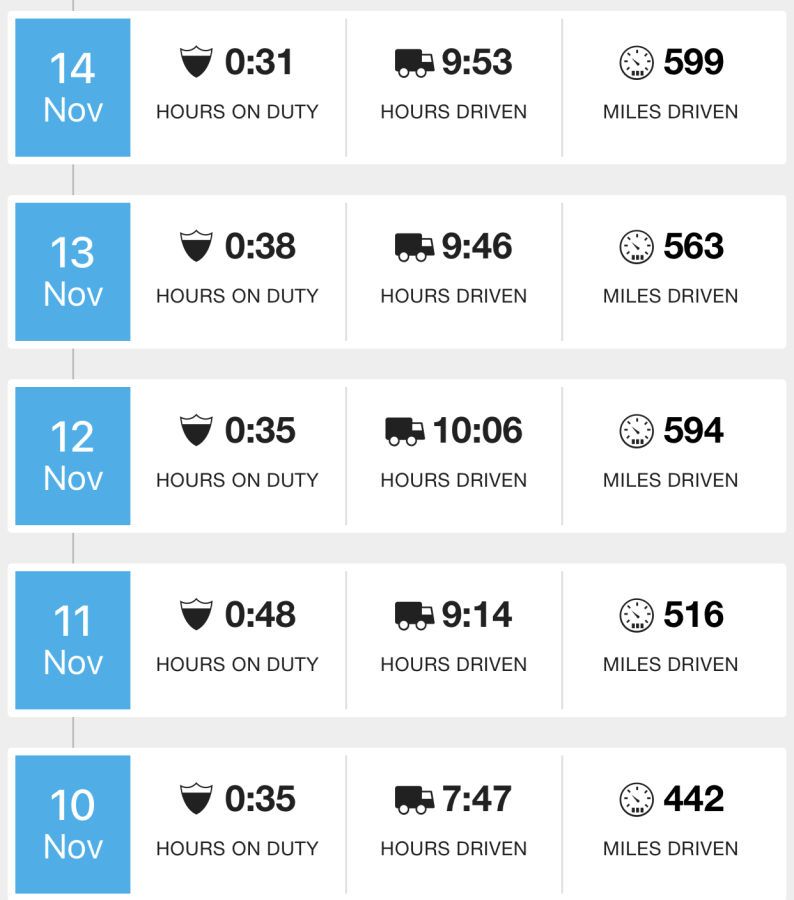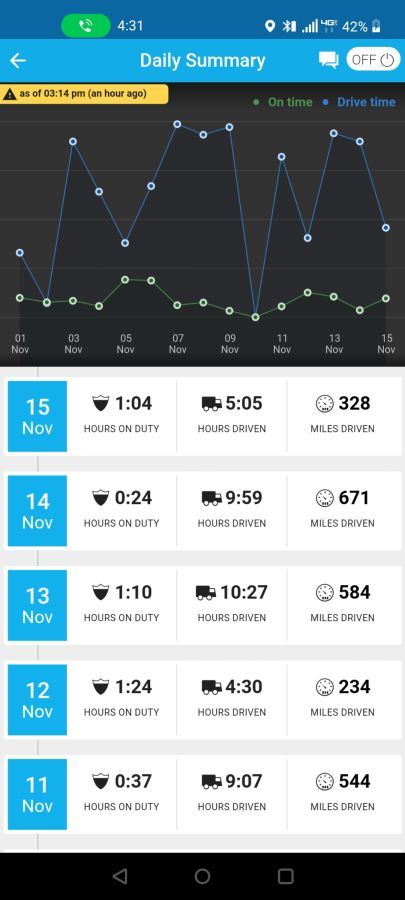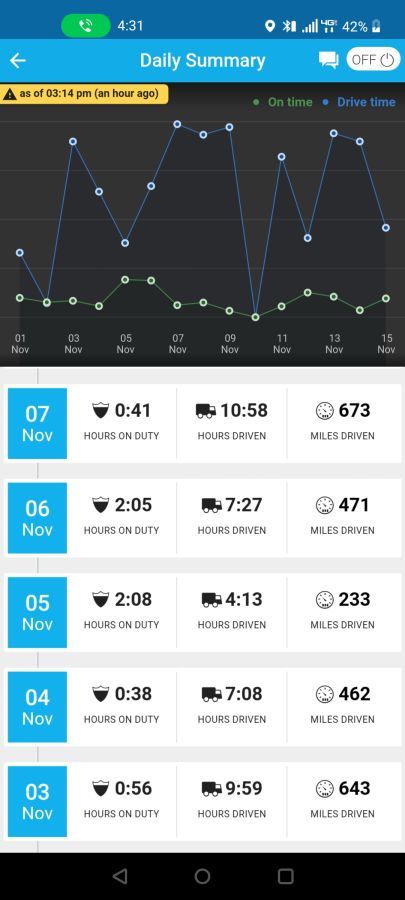Frey Miller
Topic 29072 | Page 5
Ok so I have to be on duty during a pre and postrip, fueling and while at the shipper and reciever at least until at the dock
I have to agree here. PackRat, you made the same comment about my on duty time. I can easily shave some time off of mine although I dont because I reset every weekend so I dont need to but if you are running 5-6 loads a week I dont see how one can run (legally) much lower than some of these. I would like to see some others chime in on what your daily on-duty time is. If you run one load a day you need pretrip, arrived at shipper until in a door, arrived at consigned until in a door, fuel stops and post trip for some. All on duty. Unless I clock off duty while waiting in line to check in/out, off duty while hooking/unhooking trailers, off duty while checking in/out in shipper/reciever offices etc theres not a lot of (legal) ways to reduce on duty time. It takes what it takes. PackRat, please explain how he can (legally) reduce his on duty time. Not mine as I already mentioned I could reduce mine some although still not by much.
Shipper:
The customer who is shipping the freight. This is where the driver will pick up a load and then deliver it to the receiver or consignee.
Pre trip each day: 12 to 20 minutes. Fueling: 15 minutes. Check in and out: 15 minutes. New trailer inspections: 10 minutes.
On Duty time each day for me is between 25 minutes to 45 minutes at the most.
Exceptions: An inspection at a scale or a port of entry, On Duty the entire time.
Company required urinalysis.
Supervising the loading or unloading.
Attending any mandatory training such as a safety meeting.
I have my logs looked at usually about once or twice each year during a roadside inspection or a formal check at a scale house. I've never had to explain anything to an officer about my HOS.
I conserve as many minutes on my clock as possible. Do as you want of course.
TWIC:
Transportation Worker Identification Credential
Truck drivers who regularly pick up from or deliver to the shipping ports will often be required to carry a TWIC card.
Your TWIC is a tamper-resistant biometric card which acts as both your identification in secure areas, as well as an indicator of you having passed the necessary security clearance. TWIC cards are valid for five years. The issuance of TWIC cards is overseen by the Transportation Security Administration and the Department of Homeland Security.
HOS:
Hours Of Service
HOS refers to the logbook hours of service regulations.Packrat is correct. Log it as you do it. My fuel time is normally 7-10 minutes. I combine that with the pre/post trip inspection. You can do two things at once, unless your fueling a hazmat placard trailer. About 10-15 minutes for both. Those inspections don’t have to be text book either. I was told by a old timer long ago if a insp takes longer than a cup of coffee you better learn better.
On customers. While your actually checking in/out on duty. Sitting waiting for the door, sleeper berth. When you actually go to back in back on duty. After your in and waiting back to sleeper berth.
This is company dependant. On duty yard move anytime your on private property instead of drive line. I know some companies don’t like that, but it is legal.
HAZMAT:
Hazardous Materials
Explosive, flammable, poisonous or otherwise potentially dangerous cargo. Large amounts of especially hazardous cargo are required to be placarded under HAZMAT regulations
Sleeper Berth:
The portion of the tractor behind the seats which acts as the "living space" for the driver. It generally contains a bed (or bunk beds), cabinets, lights, temperature control knobs, and 12 volt plugs for power.
HOS:
Hours Of Service
HOS refers to the logbook hours of service regulations.Whats killing the time is shipping and receiving. One person assigning doors and signing bills. It took over 45 minutes to get my bills the other day.
Here is my duty time, but I try to stay either on duty driving or off duty as much as possible, excluding times I have to log, pre and post trips, fueling, etc.

Whats killing the time is shipping and receiving. One person assigning doors and signing bills. It took over 45 minutes to get my bills the other day.
Do things the way you're comfortable with and what your company requires. With that being said many drivers log different than what they do to minimize wasted time (on duty not driving). So in that situation most drivers would stay off duty or sleeper while handling business, then go on duty while closing doors and sending macros to show some time. Again, log things the way you feel comfortable with and what your company requires. It's your butt on the line if things go wrong. Most drivers will attempt to park at shipper/receiver so they can take care of all that without starting clock so when they take off they have a full clock. If you decide to do things this way make sure you're not logging a consistent amount of time as that will look very suspicious.
Again, do what you feel comfortable with or what your company requires. what I mentioned is one way drivers do to maximize earnings by using as much of their 70 driving as possible. I've read of numerous members here doing their pretrip BEFORE starting their clock so they can have any issues resolved before their 14 starts ticking. They then log pretrip while going in for coffee or any other tasks that need to be done. All of us at some point have intentionally logged incorrectly to be beneficial such as parking at shipper/receiver and checking in while off duty, doing the 3 mph crawl while logged sleeper not trip ELD, or even doing work related activities such as trip planning while logged off duty, or even using PC incorrectly. As a driver that's always been paid hourly based on logs the extent that I've cheated was logging my 30 minute break while I was in the back 2 wheeling a couple years back. Some drivers take more chances than other. If you always log what you do you'll have nothing to worry about such as being logged sleeper while in the front seat smoking, or while inside going potty as someone mentioned in a different thread.
Shipper:
The customer who is shipping the freight. This is where the driver will pick up a load and then deliver it to the receiver or consignee.

Ok so I have to be on duty during a pre and postrip, fueling and while at the shipper and reciever at least until at the dock
I have to agree here. PackRat, you made the same comment about my on duty time. I can easily shave some time off of mine although I dont because I reset every weekend so I dont need to but if you are running 5-6 loads a week I dont see how one can run (legally) much lower than some of these. I would like to see some others chime in on what your daily on-duty time is. If you run one load a day you need pretrip, arrived at shipper until in a door, arrived at consigned until in a door, fuel stops and post trip for some. All on duty. Unless I clock off duty while waiting in line to check in/out, off duty while hooking/unhooking trailers, off duty while checking in/out in shipper/reciever offices etc theres not a lot of (legal) ways to reduce on duty time. It takes what it takes. PackRat, please explain how he can (legally) reduce his on duty time. Not mine as I already mentioned I could reduce mine some although still not by much.
I'm setting at the yard now in my rental truck, my truck is getting it's third engine....I think. Here is a screenshot of my time. I look on duty to check in at shoppers and recovers, then I go to sleeper till I'm called to a door, at that point now that we are on eld's I go on your moves to dock and then after any sites involved I go back to sleeper until dinner then log on duty and annotate check out and get my paperwork and send in my macros. That way I show all work time, what I'm doing and keep my on duty time to a minimum. Fuelling, I'm in the sleeper waiting in line, on duty for fueling and off duty when I got in the store.


Shipper:
The customer who is shipping the freight. This is where the driver will pick up a load and then deliver it to the receiver or consignee.

Yeah I agree Rob there. I always do my pretrip before I start my clock in case there are any issues I can get them taken care of before I start. I log my pretrip when I go in to get coffee.
Fuel I usually do for lunch, OD waiting in line, 7-15 mins for fuel n then OD to finish my break. I never log a post trip, even tho I do one every day.
Shipper check in and out I do all the office work logging Sleeper, I log my OD from the guard shack to wherever I have to park to go in, slow roll so I get about 7-10 mins, then my check out is when im shutting doors and sending the messages. There are the occasional hiccups, but for the most part I spend 30-45 mins on duty a day.
The only time I have more than that is when I drop n hook because I haven't figured a way to get around being on duty so much, that sounds legal anyway lol.
Shipper:
The customer who is shipping the freight. This is where the driver will pick up a load and then deliver it to the receiver or consignee.

What happened with Western Express?
Im not trying to make this TR.com but I got tired of spending 2-3 days not driving looking for empties, sliding pay scales, being in the shop majority of the time for crappy trailer and crappy miles. I was very patient with this place. A load i took to atlanta from Illinois i drove 665 miles i shutdown at 6pm Sunday and then they told me Sunday was my first day of hometime. mcdvoice There was no communication or appreciation for the drivers in the offices.
I thought you've only been driving for two weeks with them. Something you will find, every company will have issues from time to time. Two weeks isn't enough time to know anything about them. As a recommendation, stay with the new company for a while. Dont bail everytime something goes wrong. Do that too much and nobody will hire you for fear you'll do the same with them. That being said good luck with the new company.
I was very patient with this place. A load i took to atlanta from Illinois i drove 665 miles i shutdown at 6pm Sunday and then they told me Sunday was my first day of hometime.
New Reply:
New! Check out our help videos for a better understanding of our forum features

















Preview:
This topic has the following tags:
Freymiller Coronavirus Photos Truck Driving Stories







 TT On Facebook
TT On Facebook
Ok so I have to be on duty during a pre and postrip, fueling and while at the shipper and reciever at least until at the dock
Shipper:
The customer who is shipping the freight. This is where the driver will pick up a load and then deliver it to the receiver or consignee.